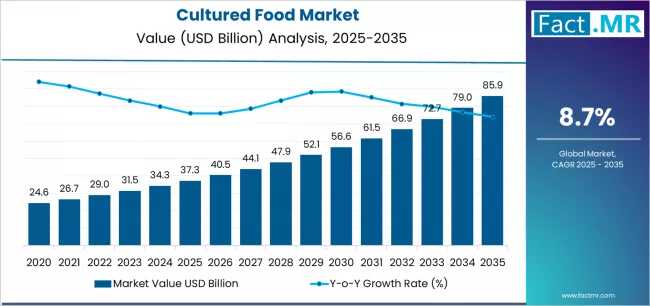Cultured Food - Top Global Industry Trends in 2026
Surging Health & Sustainability Trends to Propel Market From US$37.3B in 2025 to US$85.9B by 2035
ROCKVILLE PIKE, MD, UNITED STATES, November 19, 2025 /EINPresswire.com/ -- The global cultured food industry is entering a pivotal phase in 2026, driven by rising consumer awareness of gut health, rapid advances in food biotechnology, and the increasing demand for sustainable nutrition. As manufacturers, investors, and health-conscious consumers converge around fermented and cell-cultured innovations, the sector is poised for significant transformation. Below are the leading trends set to shape the cultured food landscape throughout 2026.1. Health & Wellness Continue to Drive Demand
Cultured foods are benefiting from an unprecedented surge in demand as consumers prioritize digestive health, immunity, and holistic wellness. Fermented staples—such as yogurt, kefir, miso, tempeh, sauerkraut, and kombucha—are earning mainstream appeal due to their probiotic qualities. This health-centric shift is expected to remain a primary growth engine through 2026, as more consumers view cultured products as daily essentials rather than specialty items.
To access the complete data tables and in-depth insights, request a Discount On The Report here: https://www.factmr.com/connectus/sample?flag=S&rep_id=11638
2. Dairy-Based Cultured Foods Retain Market Leadership
Despite the emergence of alternative formats, dairy-based cultured foods continue to dominate the global market. Their success is supported by long-standing consumer familiarity, a robust portfolio of clinically backed health benefits, and widespread retail distribution. Products like yogurt, cultured butter, sour cream, cottage cheese, and Greek yogurt are expanding into premium, organic, and fortified sub-categories, appealing to health-conscious families and lifestyle-driven consumers.
3. Rising Popularity of Plant-Based Cultured Alternatives
The plant-based cultured food segment is one of the fastest-growing areas of the industry. Driven by vegan diets, lactose intolerance, sustainability concerns, and flexitarian lifestyles, plant-based yogurts, nondairy kefir, fermented vegetable products, and soy- or nut-based cultured alternatives are capturing significant shelf space. Brands are increasingly investing in taste, texture, and nutrient enhancement to achieve parity with dairy-based products, and 2026 is expected to see substantial innovation in this domain.
4. Breakthroughs in Precision Fermentation and Cellular Agriculture
The cultured food sector is being transformed by biotechnology. Precision fermentation now enables manufacturers to create dairy-identical proteins, enzymes, and fats without animals, supporting the rise of next-generation dairy foods. Meanwhile, cellular agriculture is moving cultured meat and seafood closer to commercial viability. In 2026, advancements in cost reduction, bioreactor efficiency, and scalable production processes are expected to accelerate commercialization efforts. These technologies position the industry at the forefront of sustainable protein innovation.
5. Increased Regulatory Momentum
Regulation plays a critical role in the cultured food ecosystem, and 2026 marks a year of increased global attention to standards, safety protocols, and labeling guidelines. As governments and regulatory bodies work to establish clearer frameworks for fermented, precision-fermented, and cell-cultured products, the industry is gaining greater clarity for commercialization pathways. This regulatory momentum is expected to encourage industry-wide investment, product launches, and public trust.
6. Expansion of Online and Direct-to-Consumer Retail
E-commerce continues its upward trajectory, with online platforms becoming a major distribution channel for cultured foods. Cold-chain improvements have enabled safe, reliable delivery of fermented beverages, probiotic supplements, and fresh cultured products directly to consumers' homes. Subscription services, specialty health stores, and digital-first food brands are contributing to the sector’s growth and broadening access to premium cultured items worldwide.
7. Growth Hotspots in Asia-Pacific and Emerging Economies
Asia-Pacific remains one of the fastest-growing regions in the cultured food sector due to its deep-rooted fermentation traditions and rising interest in probiotics. Emerging markets—including India, China, Indonesia, and parts of Latin America—are seeing heightened demand for functional foods and improved access to modern retail outlets. These markets represent key investment opportunities for global manufacturers seeking expansion.
8. Sustainability as a Core Industry Value
Cultured foods are increasingly positioned as environmentally friendly alternatives to conventional food production. Fermentation and cellular agriculture offer reduced land use, lower greenhouse gas emissions, and improved resource efficiency. Sustainability messaging is becoming a central branding strategy for companies catering to climate-conscious consumers.
Conclusion
The cultured food industry in 2026 is shaped by powerful converging forces: health-driven consumption, biotechnological innovation, expanding plant-based alternatives, and global investment in sustainable food systems. While traditional dairy-based fermented products continue anchoring the market, emerging technologies and shifting consumer values are rapidly broadening the category. Companies that invest in research, transparency, and diversified product portfolios will be best positioned to lead the next era of cultured nutrition.
Purchase Full Report for Detailed Insights
For access to full forecasts, regional breakouts, company share analysis, and emerging trend assessments, you can purchase the complete report here: https://www.factmr.com/checkout/11638
Have a specific Requirements and Need Assistant on Report Pricing or Limited Budget please contact us – sales@factmr.com
To View Related Report :
Cultured Dextrose Market https://www.factmr.com/report/3676/cultured-dextrose-market
Cultured Whey Products Market https://www.factmr.com/report/cultured-whey-products-market
Food Grade Calcium Carbonate Market https://www.factmr.com/report/food-grade-calcium-carbonate-market
Food-grade Alcohol Market https://www.factmr.com/report/food-grade-alcohol-market
About Fact.MR
Fact.MR is a global market research and consulting firm, trusted by Fortune 500 companies and emerging businesses for reliable insights and strategic intelligence. With a presence across the U.S., UK, India, and Dubai, we deliver data-driven research and tailored consulting solutions across 30+ industries and 1,000+ markets. Backed by deep expertise and advanced analytics, Fact.MR helps organizations uncover opportunities, reduce risks, and make informed decisions for sustainable growth.
S. N. Jha
Fact.MR
+1 628-251-1583
email us here
Legal Disclaimer:
EIN Presswire provides this news content "as is" without warranty of any kind. We do not accept any responsibility or liability for the accuracy, content, images, videos, licenses, completeness, legality, or reliability of the information contained in this article. If you have any complaints or copyright issues related to this article, kindly contact the author above.

